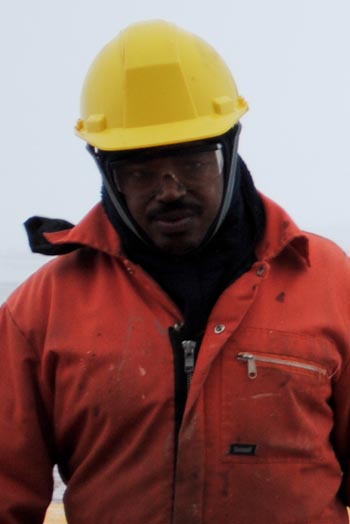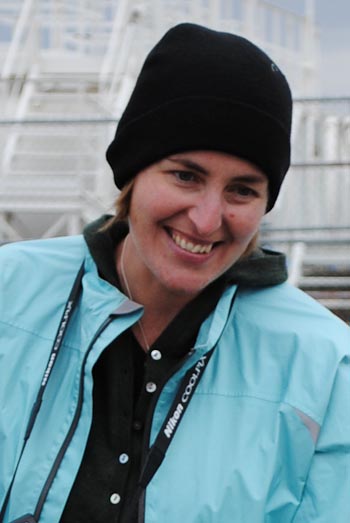Dispatch 22: Arctic Profiles #2 |
| |
Alex KainOctober 8, 2009
The following profiles compose the second of a three-part series that aims to explore diversity among the participants involved with the 2009 Joint Ocean Ice Study.
Name
Al Jarvis
Position
Winchman
Hometown
Beechville/Spryfield, Nova Scotia
Duties
Operating cranes, launching boats, maintaining deck machinery, assisting the Boson and Chief Mate.
For how long have you been in the Coast Guard?
Since 1977. I've worked on icebreaking ships, deploying and recovering buoys, on search and rescue teams, and in fishery patrol. I've been on ten different ships, give or take a ship or two.
What opportunities has the Coast Guard afforded you?
I've seen the dismantling of a German WWII radio and weather station in Labrador built by U-boats. In 1998, I participated in the Sheba Program, the first major scientific study of the Arctic. I've seen the opening and closing of the Little Cornwallis Island mineral mine. I've been to the coldest mine in the world located in Nanisivik, Nunavut. I've circumnavigated North America twice, once going east to west, once going the opposite direction. I've been to Resolute in the central Arctic, where temperatures averaged about -40 Celsius. I was part of the first expedition to the North Pole that traveled through the McClure Straits. I've met the Governor General, senators, and other important government figures. I've been part of a ship's crew during two major fires.
What has been your favorite part of being in the Coast Guard?
I've been able to work and discuss things with some of the greatest scientific minds in the world. Most importantly, I've worked with some of the best shipmates a guy could ask for.
In your 32-year tenure in the Coast Guard, what changes have you observed in shipboard life?
In the crew's downtime, we used to watch reel-to-reel movies. Now everything is on DVD. We've gone from mail received maybe two or three times a month to the Internet. I remember captains who could navigate by the stars.
What changes in Arctic wildlife and environment have you observed?
I've seen small communities like Iqualuit, Nunavut become major towns. I remember breaking multi-year ice in the lower Arctic in late June and finding open water above 80 degrees North. I remember winterizing ships in the Beaufort Sea in October and driving pickup trucks over ice in October. I've seen the decline of wildlife like walrus, polar bears, and caribou occur alongside a huge increase in the populations of birds, mosquitoes, and flies.
What changes in personal attitude have you observed?
Overall, people are now a lot more environmentally conscious and respectful of everything in the Arctic than they used to be. People used to leave vehicles running 24 hours a day for no reason. Now, people make it a priority to recycle and return garbage to land.
Describe the Arctic in a few words.
Desolate. Barren. Mesmerizing. Beautiful.
What's the first thing you do when you get home from a trip?
I have a nice drink of homemade wine with my wife, and then go back to remodeling our house.
* * * * *
Name
Lori Waters
Affiliation
Fisheries and Oceans Canada – Institute of Ocean Sciences (DFO-IOS)
Hometown
Saanichton, BC
What do you do on board?
All kinds of things. During the day shift, I sample zooplankton using bongo nets and run rosette casts. I share the task of "pickling" bacteria collected in samples, meaning we treat them with formaldehyde and put them in a minus 80 freezer. There's also some administrative stuff. We all have paperwork tasks associated with our jobs.
I also have a side project as part of the contract that allows me to be up here. I take photos of the crew working. Ultimately, I'm putting together a presentation for the federal government to demonstrate the comprehensive scientific picture that's being put together of the arctic. The purpose of this presentation is to aid in future funding.
What is your academic background?
I have a Bachelor's Degree in Fine Arts from the University of Victoria. When I graduated from college, I received a Commonwealth Scholarship and went to Ghana to complete my first Masters in fine arts with a concentration in traditional Asante bronze casting. I primarily cast biological specimens, anything from a couple inches to about a foot in size: frogs, lizards, crocodiles, gulls, insects, praying mantises, scorpions, centipedes, bats. I used the pieces in installations and shows throughout Ghana, England, and Canada.
While serving as a Commonwealth Scholar, I witnessed a number of Ghanaians my age die of AIDS. I became very concerned and interested in HIV. When I came back to Canada, I started studying science. I did my undergrad and pre-med, then tried to figure out how I was going to combine the degrees I'd done before with a more scientific focus.
I found the biomedical communications program at Medical School at the University of Toronto. I spent two years prepping for that program. They only let in 10 students every year, and to gain admission we all needed better grades in the physical sciences than the med students.
It was a rigorous program. We trained in everything from biochemistry visualizations to ornithological drawing.
How did you first become interested in the Arctic?
In my late 20s, I applied to go on an icebreaker, but at the time I lacked the necessary scientific qualifications. I kept trying, and last year started doing work with IOS, primarily creating presentations on Arctic currents. Last year I was asked to prepare all the Arctic exhibits for the Emperor of Japan's visit to IOS. It was a huge success. Following that I was asked to come on this Arctic cruise.
Why is it important to study the Arctic?
The Arctic is stunningly beautiful, but very fragile. It is a sublime environment that is so easily affected by human activity.
What is people's greatest misconception about the Arctic?
People typically have a short-range view. It's difficult to perceive large, long-term changes like global warming. People don't believe it's happening. For myself, seeing open water up here has been very eye opening.
Describe the Arctic in a few words.
Sublime. Stunning. Surprising.
What's the first thing you will do when you get home from this expedition?
Look around my garden. I grow vegetables, thyme, flowers, and grapes.
When you're at sea, what do you miss about home?
Family. My community at home. My favorite coffee shop.
When you're back home, what do you predict you'll miss about the sea?
The people. The sounds. The stunning vistas. It may sound kind of crazy, but I'll probably miss the cold as well.
Describe what it is like to feel truly cold.
It hurts, and you wonder if you're going to get feeling back, especially in your fingers and toes. I've been to Timbuktu, where it was so hot I felt like my brains were boiling. This has been the coldest environment I've ever experienced. It's an interesting contrast to go between the Arctic and the Sahara.
What's your favorite place on the Louis?
The little overhang right at the front of the foredeck. You can get under there and look out over the bow for unobstructed views of the sea. It's a great place to take pictures.
Describe the sound of ice crunching under the hull of the ship.
Spectacular. Although it's sometimes monotonous, it's an astounding reminder of the physical forces and what were actually wielding with this ship.
It's been an amazing experience up here and I really hope I get to come back. I've enjoyed every minute.
All text and photos property of Alex Kain.
Last updated: October 7, 2019 | 



